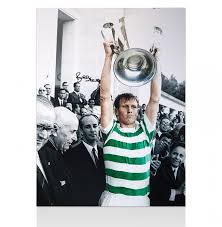Glasgow 1967: The Lisbon Lions, BBC 1 Scotland, directed by John McLaverty.
Posted by celticman on Thu, 25 May 2017

http://www.bbc.co.uk/iplayer/episode/b08rg0bd/glasgow-1967-the-lisbon-lions?suggid=b08rg0bd
Narrator Rory McCann had an easy job, everybody knows the score. Celtic were the first British team to win the European cup. Inter Milan had scored from the penalty spot in seven minutes, cancelled by an equalising second-half goal by Tommy Gemmell and a late winner from Stevie Chalmers. ‘You’re a legend John. You’re a legend.’ Bill Shankly famously said of the late great Jock Stein after this win. The anniversary of the fifty years since that famous win in the Estadio Nacional, near Lisbon, in Portugal on May 25th 1967 is commentated today, and the strange thing was I was biting my nails as if the score was still in doubt.
The joy of that victory still resonates. Celtic will never again win the European Cup or Champions League as it’s now called. Even getting into the competition is regarded as a mark of success, something to be proud of, and rightly so. It’s difficult to imagine Scotland being a powerhouse of European football. Rory McCann reminded us that in 1967 Rangers reached the final of the Cup Winners Cup and Kilmarnock the final of the Fairs Cup. These were remarkable achievements. Even Ranger’s captain of that time and voted Ranger’s greatest ever player, John Greig was wheeled out to say this Celtic team were something special and in Jock Stein they had a twelfth man. He didn’t include the referees, of course, because they were always Ranger’s men, but that didn’t matter. Celtic were so good other teams needed thirteen men.
But they were also innocent times. Bobby Lennox travelled 30 miles from Saltcoats. He was the furthest away player recruited into the European Cup winning team. The other ten players were recruited from a ten-mile radius of Parkhead. Spitting distance. Bertie Auld was in fine form as a raconteur, talking about his old Panmule Street team, that had their own song, which he sung. And how one family in a single end had 15 boys, but they didn’t have a good inside right. We were shown families crowded around tables in dilapidated and grim tenements and outside playing football. It was played 24-hours a day, boys dreamed about football and playing for Celtic (or whisper it, Rangers). Bertie Auld’s signing on fee was twenty quid. The note was the size of a telly and Bertie recounted how his mum had folded it up and shoved it down into her bra. A neighbour of Jimmy Johnstone’s recalled how he used to practice, dribbling between milk bottles, but he used put on his dad’s steel toecaps first thing in the morning and kick the ball up and down the living room. Non-stop. The pictures here are of boys, fresh faced and in their prime. Stevie Chalmers was the big money signing for £30 000, but for the post-war NHS and a Ranger’s daft surgeon he’d have died of tuberculosis and meningitis (meningococcal meningitis) in1955 as most others did. With such crowded conditions TB was common, but he lived to score that winning goal.
It’s hard to imagine in the media world of WAGs Jock Stein’s belief that wife’s shouldn’t be allowed to watch their men at work. Bobby Murdoch’s wife who attended most home matches laughed when she recalled Jimmy Johnstone’s wife Agnes coming to one of the games asking her which team was Celtic and where was wee Jinky? Imagine Posh Beck’s asking what team David Beckham plays for and where is he? It’s just so unbelievable. Jimmy Johnstone voted Celtic’s best ever player worked as a building labourer for Lawrence, and I remember my brother Stephen, saying that wee Jinky had been his labourer. Marking wee Jinky was ‘like trying to pin a wave to the sand’ was the epithet a Dukla Prague defender gave after their semi-final defeat to Celtic that year.
I’d have been four or five when Celtic won the European Cup. I wrote a story about it (luckily I can’t find it, or I’d be attaching it here). It’s one of the few childhood memories I retain. My dad eating his dinner and watching the game on telly. When Celtic scored that winner he jumped up and flung the mince and potatoes against the ceiling. He was younger than I am now. But these memories never age.
The fans here relive them. The guys that travelled by plane, bus, car, whatever way they got there, they got there. There’s a beauty in that belief. Times were hard. One guy said engagements were a big thing then, but I had to tell her, I’m going to Lisbon. Sauchiehall Street was deserted on the night of the game. Ghost town. The Celtic players sung ‘It’s a grand Old Team to play for,’ coming out of the tunnel that night. The Italian players look like film stars, but Bertie Auld as usual had the last word, ‘Aye, but can they play?’
The answer my friend is Caesar holding the cup in that iconic moment. Upwards of 150 000 met the Celtic team coming off the plane and crowded the streets in a procession. Parkhead full. I’m sure my dad would have been one of them. Him and his sidekick, my Uncle John, they couldn’t afford to go to Lisbon. But they’d have been there. Celtic in their heart and in their blood. Passed down from generation to generation. It’s a Grand Old Team…
- celticman's blog
- Log in to post comments
- 2724 reads



Comments
I remember your story about
I remember your story about your Dad and his erm unusual way of celebrating Celtic's success
cheers Elsie.
cheers Elsie.